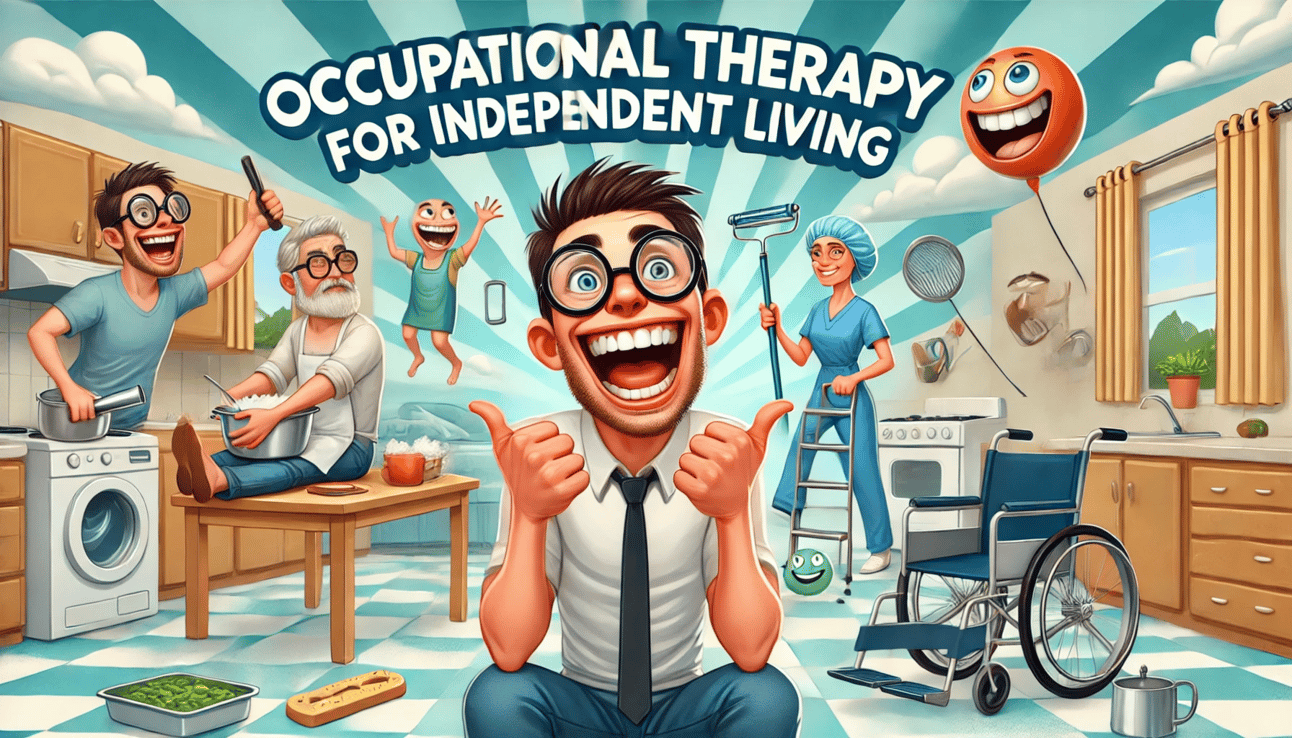Occupational therapy (OT) plays a critical role in supporting individuals with disabilities or health conditions to live independently and confidently. By helping people improve their physical, mental, and emotional well-being, occupational therapists enable individuals to perform everyday tasks that are essential for living a fulfilling life. Whether you’re recovering from an injury, managing a chronic illness, or living with a disability, occupational therapy can provide you with the tools, strategies, and support to regain or maintain independence.
In this article, we will explore how occupational therapy supports independent living, the benefits of working with an occupational therapist, and the types of interventions used to help individuals achieve their personal goals.
What is Occupational Therapy?
Occupational therapy is a health profession that focuses on helping people of all ages develop, recover, or maintain the skills needed for daily living and working. Unlike physical therapy, which primarily addresses physical mobility and strength, occupational therapy takes a holistic approach, addressing the physical, cognitive, and emotional aspects of an individual's life.
The primary goal of OT is to promote independence in meaningful activities, also known as “occupations,” that contribute to a person’s overall well-being. These activities can range from basic self-care tasks, such as dressing and bathing, to more complex tasks like cooking, managing finances, and participating in social or community activities (American Occupational Therapy Association, 2020).
How Occupational Therapy Supports Independent Living
Occupational therapy can support individuals on their journey to independent living in several ways:
Promoting Self-Care and Daily Living Skills
One of the key areas occupational therapists focus on is helping individuals develop or regain the ability to perform activities of daily living (ADLs). These activities include tasks such as bathing, dressing, grooming, and eating. For people recovering from injuries, surgeries, or managing chronic conditions, these basic tasks can become challenging. Occupational therapists provide strategies and adaptive techniques to make these tasks easier and more manageable (Law et al., 2021).
Environmental Modifications
Occupational therapists work with individuals to make their living environments safer and more accessible. This may involve recommending home modifications, such as installing grab bars, ramps, or adjusting the height of kitchen counters to accommodate individuals with mobility challenges. Modifying the environment can make a significant difference in improving safety and ease of movement, enabling individuals to navigate their homes independently (World Federation of Occupational Therapists, 2019).
Assistive Technology
Assistive technology includes devices and tools that help individuals perform tasks more easily and safely. Occupational therapists assess a person's needs and recommend appropriate assistive devices, such as wheelchairs, adaptive utensils, communication aids, or medication management tools. By incorporating these devices into daily routines, individuals can overcome physical or cognitive barriers and gain greater independence (Smith et al., 2020).
Cognitive Rehabilitation and Memory Support
For individuals with cognitive impairments, such as those resulting from a stroke, traumatic brain injury, or conditions like dementia, occupational therapy focuses on cognitive rehabilitation. This involves teaching strategies to improve memory, attention, and problem-solving skills. Occupational therapists may introduce memory aids, such as calendars, reminder apps, or structured routines to help individuals maintain independence in their daily tasks (Schultz-Krohn et al., 2020).
Mental Health Support
Occupational therapy is also beneficial for individuals facing mental health challenges. Therapists work with clients to develop coping strategies for managing stress, anxiety, and depression, helping them participate more fully in daily activities. Engaging in meaningful occupations can improve emotional well-being and reduce feelings of isolation or helplessness. Occupational therapists often collaborate with other mental health professionals to provide comprehensive care (Lloyd & Tse, 2020).
Community Integration and Social Participation
Another important aspect of occupational therapy is helping individuals reintegrate into their communities. This can involve working on skills for transportation, job readiness, or social interaction. Whether it’s helping someone return to work, volunteer in their community, or engage in social activities, occupational therapy enables individuals to build confidence and develop meaningful relationships that enhance their quality of life (Law et al., 2021).
The Role of Occupational Therapists
Occupational therapists are highly trained professionals who work closely with individuals to create personalized intervention plans based on their specific needs and goals. The process generally involves:
Assessment: The therapist conducts a thorough evaluation of the individual’s abilities, challenges, and environment. This may include assessing physical mobility, cognitive function, mental health, and the home environment.
Goal Setting: Together with the individual, the therapist sets specific, achievable goals for independent living. These goals can range from being able to cook a meal independently to managing household finances or improving social participation.
Intervention: Based on the assessment and goals, the therapist provides interventions that may include exercises, adaptive equipment, training in new techniques, or home modifications.
Evaluation and Adjustment: Occupational therapy is an ongoing process. Therapists regularly evaluate progress and adjust the treatment plan to ensure that the individual continues to make improvements and achieve their independence goals.
Benefits of Occupational Therapy for Independent Living
Occupational therapy offers numerous benefits for individuals striving for independence:
Increased Confidence: By learning new skills and gaining greater control over daily tasks, individuals often experience a boost in self-confidence.
Improved Quality of Life: Gaining independence allows individuals to engage more fully in activities they enjoy, improving overall life satisfaction.
Reduced Reliance on Caregivers: With the help of occupational therapy, many individuals can reduce their reliance on family members or professional caregivers, allowing for more autonomy.
Safety and Risk Reduction: Occupational therapists identify potential hazards in the home or workplace and implement changes that reduce the risk of injury or accidents.
Conclusion
Occupational therapy is a valuable service for individuals seeking to maintain or regain independence in their daily lives. Whether it’s through teaching self-care skills, recommending assistive technology, or modifying the home environment, occupational therapists play a crucial role in supporting individuals on their journey to independent living. By focusing on personalized care plans and holistic interventions, occupational therapy helps individuals of all ages and abilities achieve their personal goals and lead fulfilling, independent lives.
References
American Occupational Therapy Association. (2020). Occupational therapy and independent living. Retrieved from https://www.aota.org
Law, M., Polatajko, H., Baptiste, S., & Townsend, E. (2021). Enabling occupation: An occupational therapy perspective. Canadian Journal of Occupational Therapy, 88(2), 110-120.
Lloyd, C., & Tse, S. (2020). Occupational therapy and mental health: Supporting daily living. Journal of Mental Health, 29(3), 229-236.
Schultz-Krohn, W., Pendleton, H. M., & Scaffa, M. E. (2020). Occupational therapy: Practice skills for physical dysfunction. Elsevier.
Smith, R. O., et al. (2020). Assistive technology in occupational therapy practice. American Journal of Occupational Therapy, 74(3), 7203420010.
World Federation of Occupational Therapists. (2019). Guidelines for occupational therapy and independent living. WFOT Press.


